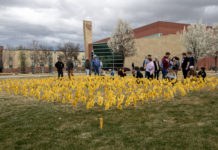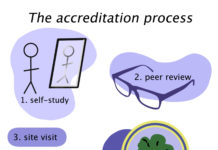Colorado Mesa University is dedicated to suicide prevention and helping students overcome suicidal ideation. Through the use of multiple channels, CMU hopes to help students struggling with personal issues to get past the initial crisis, as well as provide ongoing support. One of the avenues of support is the Student Wellness Center, where students can receive a variety of care.
“It’s not a fun topic. It’s a topic that I think a lot of us would rather not talk about. But, the reality is that’s the worst thing we can do,” Vice President of Student Services John Marshall said.
Marshall suggested the best thing that can be done for students experiencing severe depression or potentially self-harming thoughts and suicidal ideation is to have a conversation about it.
“Bring it out in the open to help them appreciate they are not alone,” Marshall said. “There’s hope and there’s help.”
CMU’s effort to help students suffering from mental health issues has been evolving over the years as the campus has grown.
“Dr. Susan Becker in psychology has been working on this issue for years. For many years she was, frankly, a voice in the wilderness,” Marshall said. “Credit to her, she stayed with it over the years. We have been able to come around her and support her.”
One method of providing support came in the application for a grant from the Substance Abuse and Mental Health Administration (SAMHSA). The first year, CMU did not receive the grant.
“We were frustrated and disappointed,” Marshall said. CMU did not give up the effort, and continued to help SAMHSA appreciate how the community and campus are particularly impacted by the issue.
“We’re in a community where, for whatever reason, this issue is especially acute,” Marshall said. “I don’t fully understand that; I’m not sure anybody does. But, the facts are pretty obvious in terms of our incidents.”
The next year, CMU received the SAMHSA grant. Through the grant, CMU attempted to raise general campus awareness, empowerment of education, training and broad prevention. CMU also hired a prevention specialist that works closely with the mentoring office to provide assist training.
“On this campus, you now can get assist training on a very regular basis,” Marshall said. “It’s a very intensive training.”
The training includes awareness training, referral training, suicide intervention and suicide prevention training. In one or two hours, groups of people who are not mental health specialists are educated and made aware of the statistics, common behaviors and how they can help.
Additionally, CMU trains professional staff, residence hall coordinators and student support staff on signs to look for and how to respond so they are equipped to intervene and get students help in a timely manner.
“We’ve put together a step-by-step suicide intervention protocol on our website for faculty and staff,” Marshall said. “I have the ability now to jump online, pull up the suicide intervention document, and I’ve got a step by step guide as a staff member or faculty member to walk them through how to ask the right questions to get them referred to the right specialists.”
Reporting methods are in place to get help to students who pose a risk to themselves in a timely manner. CMU works with the Grand Junction Police Department to orchestrate health and welfare checks.
“When minutes and hours count, that’s a huge help to us,” Marshall said.
CMU has also worked to develop a relationship with Mindsprings. When a student gets released from Mindsprings, the university works closely with them to develop a support plan and ensure the student is safe and getting care on an ongoing basis.
The Student Wellness Center is a place where students can go when they are experiencing a crisis or to receive ongoing care. The center has both 24-hour care and a staff of trained therapists, including psychiatric nurse practitioners, trauma specialists and substance abuse specialists.
“An improvement we’ve made is that it’s now all in one place,” Marshall said. “We’re trying to make this just as easy as we can possibly make it.”
Students struggling with suicidal ideation, or who know of another that is struggling have multiple options. They can go to Albers Hall, go to the office of student services or go to the wellness center. The Suicide Prevention Lifeline, another avenue of support, offers 24 hour service and can be reached by dialing 1-800-273-8255.






” When I originally commented I clicked the “”Notify me when new comments are added”” checkbox and now each time a comment is added I get four emails with the same comment Is there any way you can remove me from that service? Thanks! ” 18 oz boxing gloves mma jockstrap purple fight shorts